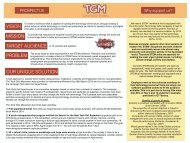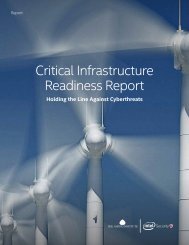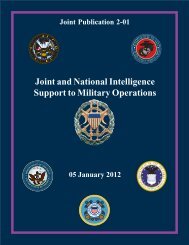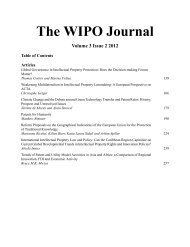Transparency Initiative (EITI)
2eoch1l
2eoch1l
Create successful ePaper yourself
Turn your PDF publications into a flip-book with our unique Google optimized e-Paper software.
83<br />
9.4 CONCLUSION<br />
Effects of the M-<strong>EITI</strong> are monitored on the activity and<br />
output level. On the outcome and impact level hypotheses<br />
in the areas of fiscal transparency and public debate are<br />
plausible, however only supported by qualitative data and<br />
perceptions. There is no evidence for strengthened anticorruption<br />
or improved trade and investment climate. The<br />
following key challenges and responding recommendations<br />
have been identified:<br />
1. Persistent lack of funding for M-<strong>EITI</strong> activities: The<br />
M-<strong>EITI</strong> process has been primarily donor funded<br />
since Mozambique became a Candidate country in<br />
2009. Insufficient and sometimes delayed financing<br />
for its core activities has constrained the M-<strong>EITI</strong> from<br />
implementing all of its planned activities in a timely<br />
manner.<br />
• M-<strong>EITI</strong> seeks more government support in order<br />
for the <strong>Initiative</strong> to be sustainable and benefit from<br />
a higher level of government ownership. M-<strong>EITI</strong><br />
should urgently develop and implement a mediumterm<br />
fund raising strategy targeting the GoM, private<br />
sector, as well as donors, and particularly focusing on<br />
raising core funding for the <strong>Initiative</strong>.<br />
• M-<strong>EITI</strong> adopts a solid monitoring and evaluation<br />
framework with proper baseline indicators, so that<br />
progress against the newly developed work plan objectives<br />
can be tracked over time. This case study has<br />
provided input at developing such a framework.<br />
2. Declining political leadership of M-<strong>EITI</strong>: the lack of<br />
high-level GoM representation at the MSG meetings<br />
has negative spillover effects on the level of representation<br />
of other stakeholders, including for the private sector<br />
representatives.<br />
• The Minister starts engaging more with the M-<strong>EITI</strong><br />
process, to enhance ownership of the process and implicitly<br />
encourage other stakeholders to do the same.<br />
This will likely lead to a stronger and more influential<br />
M-<strong>EITI</strong> process.<br />
3. The M-<strong>EITI</strong> Secretariat appears small for its mandate<br />
and engagement by the MSG in M-<strong>EITI</strong> operations is<br />
low. The MSG in Mozambique operates more like a governing<br />
board than a working board; hence, the M-<strong>EITI</strong><br />
Secretariat is in principle tasked with executing all decisions<br />
made by the MSG. Moreover, there are no subcommittees<br />
within the MSG. With the increasing scope<br />
of the <strong>EITI</strong> process, the current staffing of only four<br />
people in the M-<strong>EITI</strong> Secretariat is not sustainable. In<br />
particular, report dissemination and outreach to local<br />
communities is not achievable without more staff, but<br />
more importantly, greater engagement of the MSG.<br />
• The MSG considers transitioning from being a governing<br />
board to a working board, possibly introducing<br />
sub-committees to divide the workload amongst<br />
members. This could also create positive spillover effects<br />
on the M-<strong>EITI</strong> MSG members’ level of engagement<br />
within each of their constituencies, further supporting<br />
mainstreaming of the M-<strong>EITI</strong> process.<br />
4. Mainstreaming the M-<strong>EITI</strong> process: although the<br />
M-<strong>EITI</strong> is already credited with improving some GoM<br />
systems with regards to the taxpayer identification,<br />
no distinct efforts have yet been made to integrate<br />
the M-<strong>EITI</strong> processes into government financial and<br />
other oversight systems of public administration.<br />
However, M-<strong>EITI</strong> is planning to take a first step in<br />
this direction by introducing an e-reporting module<br />
to allow government agencies to set up electronic<br />
reporting systems that draw data directly from<br />
existing government and company systems, thereby<br />
simplifying the current data collecting process, which<br />
is currently done manually parallel to other processes.<br />
The installation of an IT network within the Ministry<br />
of Mineral Resources and Energy which is supported by<br />
World Bank seems to be unattainable before 2018.<br />
• Over the longer term, extractive industry transparency<br />
should become an integral and routine feature<br />
of how governments manage the sector. It is recommended<br />
that M-<strong>EITI</strong> also introduce the online reporting<br />
system as envisaged under the current work<br />
plan and that data collection is subsequently conducted<br />
through the online cadaster and portal.<br />
5. Further challenges relate to Institutionalizing and/or<br />
decentralizing the M-<strong>EITI</strong>; establishing a revenue<br />
sharing mechanism; engaging Parliament in the M-<strong>EITI</strong><br />
process, including through encouraging the use of<br />
M-<strong>EITI</strong> reports as input for budget discussions; as well<br />
as strengthening collaboration with Mozambican<br />
academia/students.









